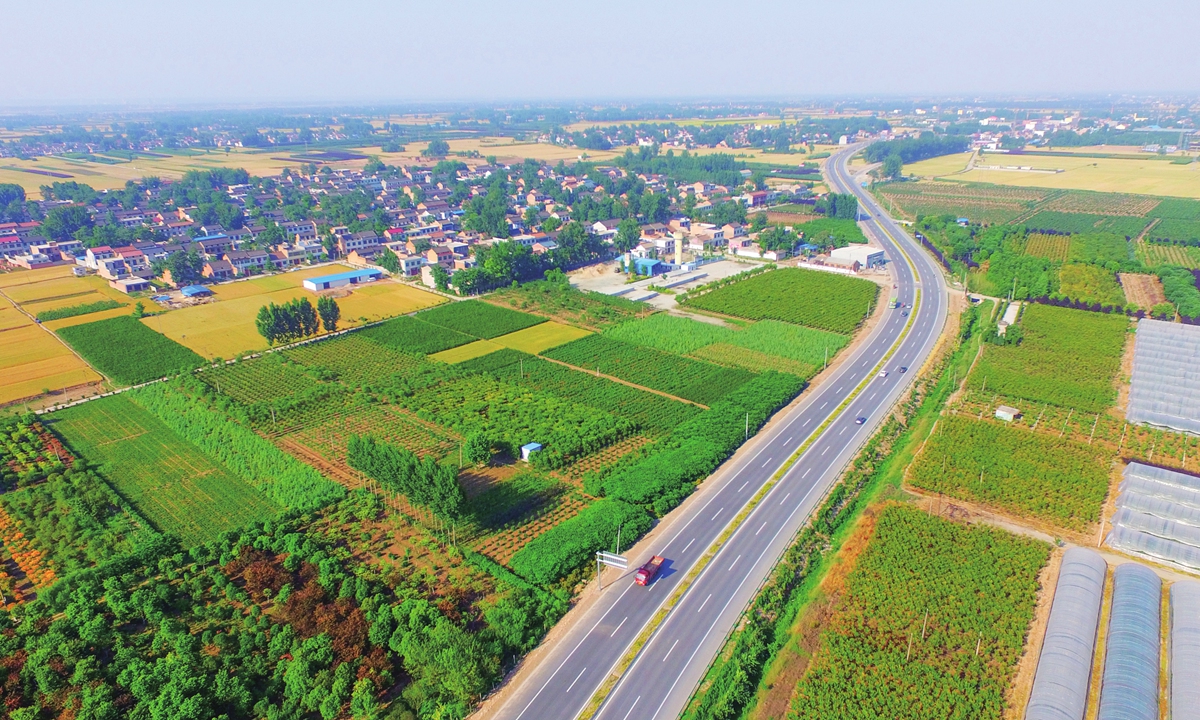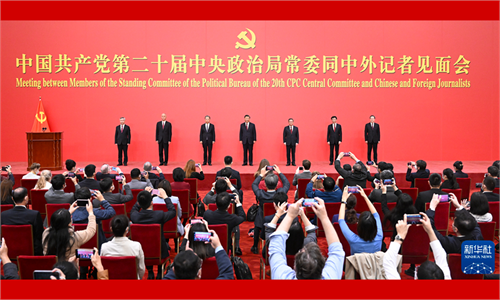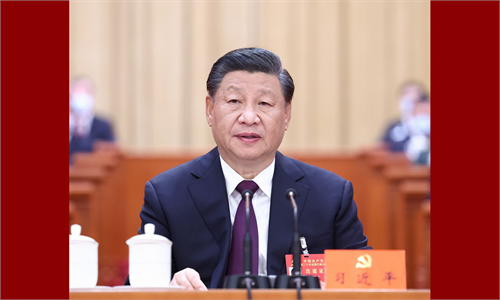
Photo VCG
Editor's Note:
For Chinese people, the past decade has been epic and inspirational. The country, under the leadership of the Communist Party of China (CPC) Central Committee with Comrade Xi Jinping at the core, has made great endeavors in boosting its economy, deepening reforms, improving the rights of its people and acting as a responsible global power.
"The past decade saw the anti-corruption campaign, which really laid the foundation for many of the achievements that followed," Josef Gregory Mahoney (Mahoney), professor of Politics and International Relations at East China Normal University and senior research fellow with the Institute for the Development of Socialism with Chinese Characteristics at Southeast University, spoke highly of China's anti-corruption campaign in a written interview with Global Times (GT) reporter Lu Yuanzhi.
This is the 27th article of the Global Times series about this special decade.
GT: You have lived in Shanghai for more than 10 years. What's your take on China's development in the past decade? Which changes have impressed you the most?
Mahoney: The past decade saw the anti-corruption campaign, which really laid the foundation for many of the achievements that followed. To be sure, the project of raising hundreds of millions out of poverty, building a populace of more than 400 million middle income earners and eradicating absolute poverty are the result of many decades of efforts, but I think it's unlikely that we would have seen China reaching the xiaokang society goal without the anti-corruption campaign. Additionally, I think we can point to rapid digitalization and China's rise as an advanced technological society, which supports reformed government and makes possible China's incredible achievements associated with containing COVID-19.
GT: You once participated in translating works by former Chinese leaders with the Central Compilation and Translation Bureau (CCTB). What impression have the CPC leaders left on you? How do you view the CPC's role in China's development over the past decade?
Mahoney: One of the key lessons I learned when working with the CCTB was how complex the Chinese political system really is, and how it works hard to represent a massive, diverse population, harnessing it for national development and common prosperity. Indeed, the complexities are hard to conceptualize given their breadth and depth, and because the Chinese system doesn't always reveal these complexities as a matter of tactical necessity.
For these reasons and others, foreign observers, both the Sinologists and the laymen, tend to take a highly reductive and therefore extreme view of China. They don't understand the principles and practices of collective leadership or democratic centralism. And they don't understand that the complexities and development of the CPC mirror the complexities and development of the state and the people. Instead, they want to view these three entities as being necessarily separate categories, in conflict with each other, because this conforms to their own experiences, especially in the West.
In China, what we see with the CPC is a perpetual renewal, and this has been showcased especially in the past ten years. The CPC has managed to avoid the sort of systemic rot that we see in the US, where we have separate powers and more than one party but no effective means to outflank corruption or poor governance once it infects each branch and party. Rather, they can entrench themselves against each other. So oddly enough, given one-party rule and effective centralized leadership, reforms can be enacted across the system to prevent intractable and debilitating systemic problems from dragging the whole country down. Instead, we can see a militant organizational workstyle solving problems and helping the people advance, whether this requires disciplining key economic players, like major tech firms, or the major property developers, or the afterschool education industry, or even the Party itself.
GT: You recently wrote an opinion piece saying that the US and UK "normatively prescribed in rather narrow conceptual terms how democracy can be defined, even though these countries built their power and prestige through unconscionable and irreconcilable histories of imperialism, genocide and dispossession." What's your take on the US and some Western countries seeing China as a "one-party authoritarian" state?Why have the US media and politicians continued to smear China's political system?
Mahoney: I think this happens in the West because they project pride in place of real confidence. They know very well their own problems; they just can't imagine that someone else has found a better way or an equally legitimate way. Unfortunately, this problem in the West is accommodated by China to some extent. For example, China often tries to argue with the West using the language and logic of the West, without realizing perhaps that once you start communicating within a Western way of thinking, you by necessity fall into the trap of a certain type of cultural egoism. Furthermore, when China is communicating with the West, it rarely demonstrates a sense of humor. This is understandable of course - one should be serious and sober in foreign affairs, and one should not laugh at others' expense - but at the same time, if you always take some fools seriously, then you can end up looking foolish yourself.
But the reason Western media and politicians continue to smear China's political system, and more than that if we look at the horrible things that were said about Chinese culture during the pandemic, is that it's a style of dog whistle politics that panders to racism and ethnocentrism, and attracts a wide audience. Furthermore, because "communism" is already a bad word for many in the US, it's easy to demonize the CPC and rationalize this as fair criticism when in fact most who do so are merely projecting their cultural and political biases in pseudo-intellectual ways - ignorance posing as intelligence when it comes to discussing China. I sometimes visit the US and encounter old friends and colleagues who've never been to China who want to explain the "true China" to me. It's exhausting and nearly impossible to convince them otherwise. There's just a wanton stupidity that possesses a lot of people when they pontificate about China or how the US is better.
GT: Western political parties are constantly fighting internally without solving real problems, leading the approval ratings of many ruling parties to fall to a record low. Compared with Western democracies, what are the advantages of the Chinese governance model?
Mahoney: If we look at the long history of the West vs. Chinese civilization up to the present, what we find it seems are different capacities for civilization itself. One can argue that one rarely finds a Western example of a large state that is able to maintain peace and development in tandem with good self-governance for a sustained period of time. To be sure we find many examples of empires, from the Greeks and the Romans to the British and the Americans, that rise and fall, and many examples of positive contributions to human development, but none achieve the sort of civilizational continuity found in Chinese experience. Why is this? Is it because there's a different logic, a different way of thinking, perhaps rooted in deep linguistic differences? Is it due to a unique geography playing an important role in hominization? Is it in part due to luck? For example, the Qin by some accounts innovated an analogue of a modern state system at least a thousand years before anyone else - an achievement that was solidified by the dynasties that followed. Perhaps this was in part due to good fortune, insomuch as the we know the genius of the Qin certainly had its limits? In fact, there are many competing theories, but it's in this broader historical context that I place the development of whole process democracy.
Many are familiar with Lucian Pye's observations that modern China is a civilization struggling to fit itself into the Western model of the nation-state. What many fail to do however, is examine critically the other side of Pye's analysis, in other words, the possibility that Western nation-states are struggling to manifest themselves as civilizations. Now I don't want to argue that whole process democracy represents an "end of history" achievement; but I think in theory and practice it represents an honest and effective solution to the challenge that Pye observed, one that builds on and advances Chinese civilization without succumbing necessarily to the zero-sum values in the West that in one form or another have been the cause of rapid rises and falls through time.
GT: The CPC is leading the Chinese people on a new journey toward realizing the second centenary goal. What can other countries, especially developing ones, learn from the CPC governance?
Mahoney: I don't believe there's a Chinese model of governance or economic development that can or should be exported to other countries, but there are some basic lessons that many should try to learn. First, organization is key, along with discipline and strategic vision. No other political system has done this better than China's. Second, you have to have a revolutionary capacity for changing yourself if you want to lead the sort of changes you envision for your country. And similarly, perhaps no other political system has demonstrated a capacity comparable to China's for reform and adaptation, and doing so in ways that fundamentally improve the system and the nation without leaving either in ruins. And third, you can't simply copy others. You have to innovate solutions that fit your situation and circumstances, that resonate with your own cultural values and intelligence, otherwise you'll definitely encounter one form of ruin or another. But above all, you have to bring progress, call it modernity or technological society or improved income and social welfare for the masses. You have to advance common prosperity. This project started with the grassroots work of Mao Zedong, and it continues today.
GT: What are your expectations for China's development after the 20th CPC National Congress?
Mahoney: I think the two major themes of this Congress will be continuity and change. And this theme will accommodate the policies we'll see associated with the Congress for China's development. A lot of the basic policy frameworks have already been established, but we'll see deeper commitments to core areas of concern, for example. I think we'll see more emphasis on rural development and efforts to hold onto and extend development gains as we continue to recover from the pandemic. In urban areas, I expect them to focus on tech upgrading of medium-sized enterprises, and hopefully, deep policy support to help small businesses recover.
We know the terms "new era" and "changes unseen in a century" are key descriptions Chinese leaders are using, and we know that comparable language is now also appearing in documents like Biden's new National Security Strategy. Both the Chinese and American sides are pointing to the next five to ten years as being exceptionally important.
China's development strategy has already achieved the goal of becoming a strong and wealthy nation. Now, China's national rejuvenation project emphasizes becoming strong in every respect, to achieve strategic autonomy in an increasingly uncertain world, but also to serve as a source of positive, global stability, with an advanced capacity to contribute to a shared future for humanity. This is the dialectics of the new era - the intersection of nationalism and internationalism - and an excellent example of Chinese Marxism.


